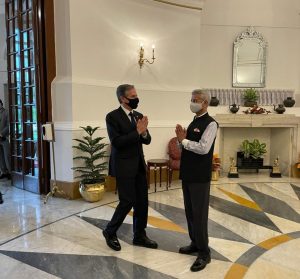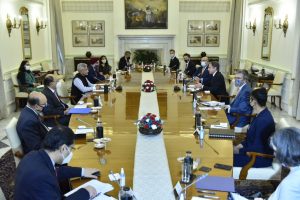
Amid the seemingly triumphant march by the Taliban, the foreign ministers of India and the US spoke with one voice on promoting a negotiated solution to the Afghan crisis and underlined the imperative for shaping an “inclusive and democratic Afghanistan.”
“Regarding Afghanistan, it is essential that peace negotiations are taken seriously by all parties. The world wishes to see an independent, sovereign, democratic and stable Afghanistan at peace with itself and with its neighbours but its independence and sovereignty will only be ensured if it is free from malign influences,” India’s External Affairs Minister S. Jaishankar said at a joint press conference with US Secretary of State Antony Blinken.
“Similarly unilateral imposition of will by any party will obviously not be democratic and can never lead to stability nor indeed can such efforts ever acquire legitimacy,” said Mr Jaishankar in remarks that were aimed at the Taliban as well as Pakistan.
Mr Jaishankar stressed that peace negotiations are the only way to create a lasting solution and must take into account the diversity of Afghanistan. “Our views were quite similar,” said Jaishankar while alluding to his wide-ranging talks with Mr Blinken, who was on his first visit to India.

In similar-sounding phrases, the US’ top diplomat rejected any military solution to the Afghan crisis. “We’re both committed to the proposition that there is no military solution to the conflict that afflicts Afghanistan, there has to be a peaceful resolution, which requires the Taliban and the Afghan government to come to the table,” said Mr Blinken.
‘And we both agree, I think strongly that any future government Afghanistan has to be inclusive and fully representative of the Afghan people. But ultimately, this has to be an Afghan-led and Afghan-owned peace process that we will all support,” he said in response to a question.
Underscoring the rejection of military force to define the future of the country, Mr Blinken reaffirmed the US support for “an Afghanistan that is inclusive and representative of its people. “So I would say that we are both not only in alignment, but working together and also working with other countries, both neighbouring Afghanistan and in the region to support that kind of future for Afghanistan.”
In a stern warning to the Taliban, Mr Blinken made it clear that “an Afghanistan that does not respect the rights of its people, an Afghanistan that commits atrocities against its own people, would become a pariah state.” “There’s only one path, and that’s at the negotiating table to resolve the conflict peacefully and to have an Afghanistan emerge that is governed in a genuinely inclusive way and that’s representative of all its people.”
Blinken also added that although the US troops are withdrawing, the US remains very much engaged in the diplomacy, of working to bring the parties together at the table for a peaceful resolution of the conflict.
Quad not anti-China alliance
Besides the Afghan situation, the two ministers focused on firming the agenda for the Quad ministerial meeting and the first in-person summit of the Quad to be held in the US later this year. The two interlocutors spoke spiritedly about expanding bilateral cooperation in the Indo-Pacific, but took care to repudiate the portrayal of the Quad as a counter-China grouping.
Secretary Blinken rejected the categorisation of the Quad as a military alliance and stressed that the four like-minded countries are “coordinating, pooling our resources, pooling our thinking, and actively collaborating on a whole variety of issues that have an impact on the lives of our people on COVID-19.” “What the Quad is not as a military alliance, it is not that. Its purpose is again, just to advance cooperation, on regional challenges, while reinforcing international rules and values that we believe together underpin peace, prosperity and stability in the region.”
Democracy Connect
The talks between the two foreign ministers reaffirmed the critical importance of the India-US partnership in a mutating global geopolitical landscape. The talks also covered contentious issues with Mr Blinken raising concerns about perceived erosion of democratic norms and freedom of expression in India, but these were minor discordant notes in an overwhelmingly positive conversation on advancing cooperation between the world’s oldest and largest democracies. In remarks that exemplified diplomatic subtlety, Mr Blinken underlined shared democratic values that underpin robust India-US partnership. “Like our own, India’s democracy is powered by its free-thinking citizens. We applaud that, and we view Indian democracy as a force for good in defense of a free and open Indo-Pacific – indeed, a free and open world,” he said.
“We also recognize that every democracy, starting with our own, is a work in progress. And when we discuss these issues, I certainly do it from a starting point of humility.”
Author Profile

- Manish Chand is Founder and Editor-in-Chief of India Writes Network (www.indiawrites.org) and India and World, a pioneering magazine focused on international affairs. He is CEO, Centre for Global India Insights, an India-based think tank focused on global affairs.
Latest entries
 India and the WorldFebruary 27, 2026Modi visit: India-Israel partnership enters a new era
India and the WorldFebruary 27, 2026Modi visit: India-Israel partnership enters a new era India and the WorldFebruary 24, 2026Unravelling Modi’s Israel journey: What to expect
India and the WorldFebruary 24, 2026Unravelling Modi’s Israel journey: What to expect India and the WorldFebruary 17, 2026South-by-South: Focus on people-centric solutions at India AI summit
India and the WorldFebruary 17, 2026South-by-South: Focus on people-centric solutions at India AI summit India and the WorldFebruary 7, 2026Modi hails interim India-US trade deal, Goyal says no concessions made on agriculture
India and the WorldFebruary 7, 2026Modi hails interim India-US trade deal, Goyal says no concessions made on agriculture







